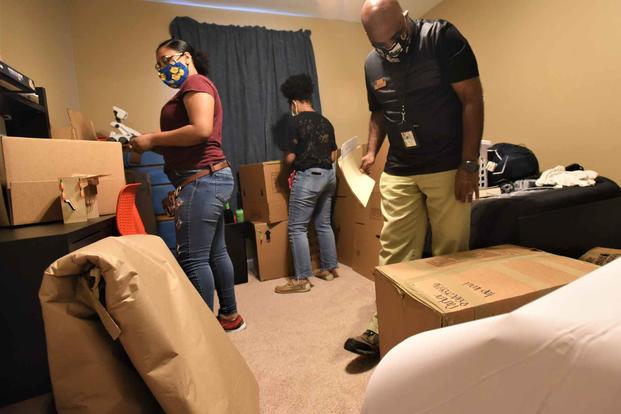The opinions expressed in this op-ed are those of the author and do not necessarily reflect the views of Military.com. If you would like to submit your own commentary, please send your article to opinions@military.com for consideration.
One of the many things that make a PCS move stressful for military families is worrying about the weight of household goods in your shipment. Should I have a garage sale? Should I sell my snowblower before my transfer to Hawaii? Should I wait to buy (insert desired item) until after the move?
But there is something else going on that is making this issue much worse and much more expensive. A quick look at any of the social media pages dedicated to military PCS moves yields countless complaints about shipments being over the service members' maximum allowable weight and, often, much higher costs than anticipated.
What's going on? Some moving companies that have been entrusted to move household goods for military members and their families have learned to exploit vulnerabilities in the process. One way is for the moving company to claim the shipment weighs more than it actually does, also known as weight fraud. There's a long history of this kind of fraud, sometimes known as "weight bumping."
Fraudulently increasing the weight of the shipment costs the government money, and if it brings your shipment over your maximum allowable weight, it will cost you money too. When spread across the costs of packing, storage, transport and unpacking, even minor increases in weight can translate into thousands of dollars.
Is it happening to you? Members who have moved before have a resource to help answer that question. By logging into the Defense Property System (DPS), you can view the weight of your previous PCS. Then ask yourself, does the increase in weight seem reasonable? If your shipment weighs an additional 2,500 pounds and your only major addition was a new recliner, that's a big red flag.
There are other ways to get a sense of whether the shipment weight is reasonable. Often, the moving company will send a representative to conduct a pre-move survey and provide a weight estimate. If the shipment weight is substantially higher than that estimate, there may be an issue. You can also use the weight estimator tool on MilitaryOneSource.mil to get a rough idea of what your shipment will weigh.
What can we do about it? The good news is this type of fraud can be defeated with an in-person re-weigh in which you or your representative are present when the shipment is weighed. Interstate shipments are protected by 49 CFR § 375.517, which allows you to demand a re-weigh, and 49 CFR § 375.513, which allows you to insist upon being present for that re-weigh.
How can you assert those rights? First, send an email. Let the following folks listed below know what the issue is. It could be as simple as "my shipment weight seems way too high."
- The Military Claims Office (MCO) for your branch of service (they are the experts regarding all the contracting rules)
- The Regional Quality Assurance Office (QA) that services your area (they are the boots on the ground who can help you locally)
- The Joint Personal Property Shipping Office (JPPSO) handling your shipment (they coordinate the shipment with the transportation service provider on your behalf)
- Your Supervisor (It is a good idea to keep them informed. They may be able to provide resources, and you may need time off work to view the re-weigh.)
Next, email your moving company. Tell them you are demanding an in-person re-weigh in accordance with 49 CFR § 375.513 and 49 CFR § 375.517. Make sure it is absolutely clear that you want to be there for the re-weigh.
CC the Military Claims Office, Quality Assurance Office, Joint Personal Property Shipping Office and your supervisor on the email.
If the moving company refuses to do an in-person re-weigh, you have the right to refuse delivery of the shipment until they do. Ideally, having all the appropriate people in the loop will prevent this.
There are several other things to keep in mind.
Moving companies have been known to contact customers at the last minute regarding the re-weigh and make it as inconvenient as possible. Maintain frequent contact with your moving company to ensure this doesn't happen. Do this via email to ensure it is documented.
The empty weight is just as important as the loaded weight. You must view the loaded weight (pre-delivery), then accompany the truck back to the scales to obtain the empty weight immediately after your delivery is completed. Moving companies have been known to add extra weight to increase the loaded weight ticket, then remove it prior to obtaining the empty weight ticket.
No one is allowed to be in the vehicle/on the scale when the shipment is weighed. Moving companies have been known to have the whole moving crew on the scale for the loaded weight, then absent for the empty weight. This could easily add 1,000 pounds to your shipment.
Take photos of the loaded and empty weight tickets as soon as the driver receives them. You will need them to prove the actual weight. You should also take photos of the truck and trailer, including their markings and license plates.
Do not ask for or agree to a re-weigh that you will not be present for. Moving companies will offer to "double-check" the weight. Don't be fooled: They may use that as a basis to refuse to do an in-person re-weigh, claiming that you already declined the opportunity to be present.
Don't risk a bill for thousands of dollars. Go the extra mile to make sure the weight is correct. If enough of us do this, they won't be able to defraud any of us.
Quality assurance representatives, consider having your office audit a certain percentage of all shipments by attending weigh-ins. If 10% to 20% of shipments were audited, it would have a significant deterrent effect on this type of fraud.
U.S. Transportation Command representatives, consider implementing a reporting process so that military members or quality assurance representatives can let you know when this is occurring. Then stop giving those companies contracts.
-- Tom Marin is a retired Coast Guard Investigative Service special agent and survivor of eight military PCSs.











